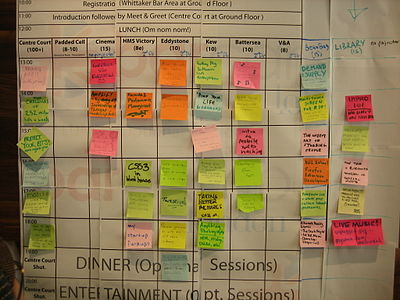Run Your Own Barcamp Kit
Programme
Depending on the number of participants, you should schedule a number of concurrent slots, averaging about 15-25 participants each. Any larger or smaller and the sessions don't work as well.
- Ideas for activities to turn talk into action will be included in the conference notebook.
- Budget: nice if there is money available to make things comfortable
An example of an open grid:
| Registration |
Day 1 |
Day 2 |
| 9:30-10:30am |
Ignite Talks |
Ignite Talks |
| 10:30-11:00am |
Morning Tea |
Morning Tea |
| 11:00-11:50am |
Session 1 |
Session 6 |
| 11:50-12:40pm |
Session 2 |
Session 7 |
| 12:40-1:30pm |
Lunchtime |
Lunchtime |
| 1:30-2:20 |
Session 3 |
Session 8 |
| 2:20-3:10 |
Session 4 |
Session 9 |
| 3:10-3:30pm |
Plenary |
Plenary |
| 3:30pm |
Refeshments |
Refreshments |
If you're holding the barcamp onsite, it’s important to mark the days as being different from normal:
- Conference bags, with things to play with
- Movies playing? TED talks?
- Twitter stream? Use a hastag and run a Twitterwall if your staff are 'tweeters'
- Flip camera taking footage of lightbulb moments? Photos as well.
Spaces: Arranging furniture, whiteboards to let students know where they are going, music in the cafe? Have nice tables available, two presentations per common, one in the cafe? -have cloths on tables, dried fruits and nuts, -music in the cafe,
Catering: Food and drinks. Shared lunch both days, drinks on Thursday. Home baking for interval on both days.
Swag: Hit the $2 shops. Find some little games or brainteaser toys for people to have fun with. Notebook, school pen and ruler, advice for the day pasted into the notebook. Mints? Sweets?
Suggested activities to turn talk into next steps. Coming together at the end.
Instructions for participants
Should we put the open grid up on Monday so people can begin planning sessions? How planned do they have to be? Sessions are 50 minutes long, don’t prepare something to fill the whole time. Leave others space to bring their experience. Be as prepared with something to present, or a way to facilitate sharing.
What is an Unconference? An unconference is a (participant-driven event.) Rather than inviting people to attend a conference where everything has been decided by others in advance (the speakers, the content, the timetable, the spaces etc.) an unconference emerges out of the strengths and interests of the people who attend.
How does it work? The *(open grid): if you would like to meet up with others to talk about something that interests you, write the title of the session in one of the timetable slots on the day. Anyone else who wants to take part (or co-convene with you) turns up at the appointed time and contributes what they can. It makes for a very responsive, very engaging event which is grass roots and bottom up. If your session sounds similar to one already being proposed, merge the two and co-convene.
Think of an unconference as being three things:
- a place for exchanges - where people interested in innovation can communicate.
- a think-tank - where new ideas can be produced collaboratively
- an incubator - where ideas can be shared, fostered and extended.
Advice:
- The answers lie in the room. The people in your session are precisely the people you need. Whatever comes out of your session is exactly what was needed.
- The rule of two feet. If the session you’re in isn’t quite what you imagined it would be, use your two feet. Facilitators won’t be offended because they know they are free to do the same in your session.
- Organise the furniture however you want it; it’s your space.
- Talk from your own experience. Successful sessions are centred on ‘here’s something I’ve done...’ not ‘why doesn’t somebody do...’
- Things get done when people do them. If you see a job that needs doing, feel free to do it.
- 50 minute sessions
- You can do anything! Pose a question, talk about something that went awesome, lament over something that flopped, talk about an idea or a teaching practice you’ve heard of.
- There are 5 sessions a day with drinks to discuss stuff on Thursday night.
| *http://dancallahan.net/2012/02/17/some-advice-for-organizers-of-upcoming-edcamps-edcamp-edchat |

